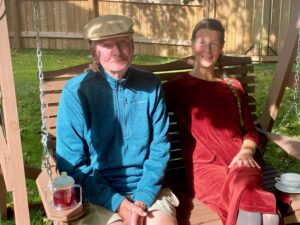19 Jan OBITUARY: Arthur Edwin Osmond October 3rd 1947–November 30th 2021 by Susan Koppersmith
 A few years ago when visiting Nova Scotia, our Society president, Micah Edelstein, invited me to a study group at the home of long-time anthroposophists, Arthur and Margaret Osmond, who lived in Dartmouth — just across the harbour from Halifax.
A few years ago when visiting Nova Scotia, our Society president, Micah Edelstein, invited me to a study group at the home of long-time anthroposophists, Arthur and Margaret Osmond, who lived in Dartmouth — just across the harbour from Halifax.
The Osmond’s house was near Oathill Lake which is close to the house in Dartmouth, where I spent my early teenage years. Dense forest surrounded Oathill Lake in those days. Much of this has been replaced by single-family homes with gardens and trees — different, but still a pleasant environment. Arthur and Margaret lived in one of these houses. They invited me for dinner with a chance to take part in a study group afterwards. We ate our meal at a large round table placed near a picture window where the living room would normally be in a house. This space seemed especially created to welcome guests and share food! Behind the table and against the wall, was a sofa and chairs where our study took place.
Arthur, born in the US, spent 35 years in the UK. He and Margaret had lived and taught in Kings Langley, near London. Margaret is a Eurythmist and Arthur, also a Eurythmist, was a former Waldorf class teacher with special talents to teach gardening and religion and direct plays in the lower school. At the time I visited, he was also the Class Holder for Nova Scotia. He rose every morning just after 3 am to do meditative and Eurythmy practice. Then he travelled to be in time for his 5 am shift at Pete’s Frootique, a high-end grocery and catering store in Halifax where he worked full-time as the produce clerk. He was known there as Arthur, King of Organics because he used every opportunity to promote organic food.
I asked Margaret, “Why did your family move to Dartmouth from Kings Langley? Why move from a centre of anthroposophy to a city in a new country thousands of miles away where there is no Waldorf School and little anthroposophical activity?”
She said it was because of the “light.” This struck me as odd, because I had no awareness that Dartmouth possessed anything that was special. She said that she and Arthur and their daughter, Dee, had visited Dartmouth years earlier because her sister lived there and they had always wanted to visit the Maritimes. They noticed and appreciated the quality of light around Dartmouth’s hills and many lakes.
They then returned to Kings Langley thinking that they would forget about this part of the world and life would carry on as usual back in England. But it didn’t. The charms of Dartmouth kept coming to mind and, after a year(in 2008), they decided to move permanently to Nova Scotia.
During my visit, the Osmond’s and I talked of many things, including our Anthroposophical Society. I came away thankful that one can visit Society members across Canada and feel welcome in each other’s homes because it is the fellowship in our Society that unites us.
Now fast-forward several years when, this past October on a return-visit to Nova Scotia, I was able to visit the Osmond’s again. Beforehand, Margaret had let me know that Arthur had developed dementia. He had been slowly losing his memory and two years ago was officially diagnosed. I arrived on a sunny warm day; we had a leisurely lunch, followed by a long walk around Oathill Lake.
While Margaret and I exchanged news, Arthur stayed close by, always looking at us with eyes that radiated great warmth and connection. If we asked him a question, he responded with a simple answer.
I came back to Vancouver with the thought of writing about my Dartmouth friends for the “Meeting One Another” series in our Society’s eNews. Then an email came from Margaret in early December with the news that Arthur had unexpectedly passed the threshold on November 30th.
In a phone call to her, I learned that on that Tuesday, she and Arthur had had a normal day — shopping on foot for groceries on a day that was bitterly cold. After dinner, he seemed unwell. With Arthur beside her, she phoned a nurse who wondered about the strange gurgling sound she heard on the other end of the line. When she learned it came from Arthur, she arranged for an ambulance to come around at once. Margaret asked him if he was a little afraid; he nodded slightly. Did anything hurt? He shook his head.
Two young paramedics arrived to find Arthur still sitting in his chair in front of a window. They attached a heart monitor to him. Then, after a few moments, he looked up, turned his head back towards the window and the stars that were shining brightly behind him. He breathed out gently and was gone. The paramedics looked at one another in astonishment. Margaret said there was no fear and no struggle; it was as if a door suddenly opened for him and he slipped through. Their daughter, Dee, arrived shortly afterwards. They each held one of his hands and told him stories of his life and their appreciation for what a loving husband and father he had been.
A few days later, Margaret organized a memorial for him at the local funeral home by providing a Christmas tree with roses, words from the St. John Gospel and an advent candle in an apple for each of the guests. She felt that introducing these customs, which came so easily to her, profoundly affected those in the funeral home and the guests who had never experienced these traditions before.
 All who knew Arthur recognized his moral sense and his courage and enthusiasm for new projects. His well-developed will could overpower some who felt that they had to take a step back to keep their own centre. To Margaret, he was a towering spirit cramped into a body that had known the ravages of illness. As a young person, he had contracted polio and overcame it, though its after-effects lingered.
All who knew Arthur recognized his moral sense and his courage and enthusiasm for new projects. His well-developed will could overpower some who felt that they had to take a step back to keep their own centre. To Margaret, he was a towering spirit cramped into a body that had known the ravages of illness. As a young person, he had contracted polio and overcame it, though its after-effects lingered.
An abiding theme in Arthur’s life was “friendship.” At age 11, he was chosen as a delegate that brought children from around the world to Scotland to come up with ideas to promote World Friendship. Later, when he joined our Society he wanted to be part of an organization which looked outward and promoted brotherliness.
Margaret expresses that, “miraculously,” she is not experiencing great grief with Arthur’s passing. He is continually with her and she is determined to carry forward his impulse of cultivating friendships inside and outside our Society.
She says, “You have to pay attention to the word ‘ship’ in friendship. It is a boat that is going somewhere; it has a destination
